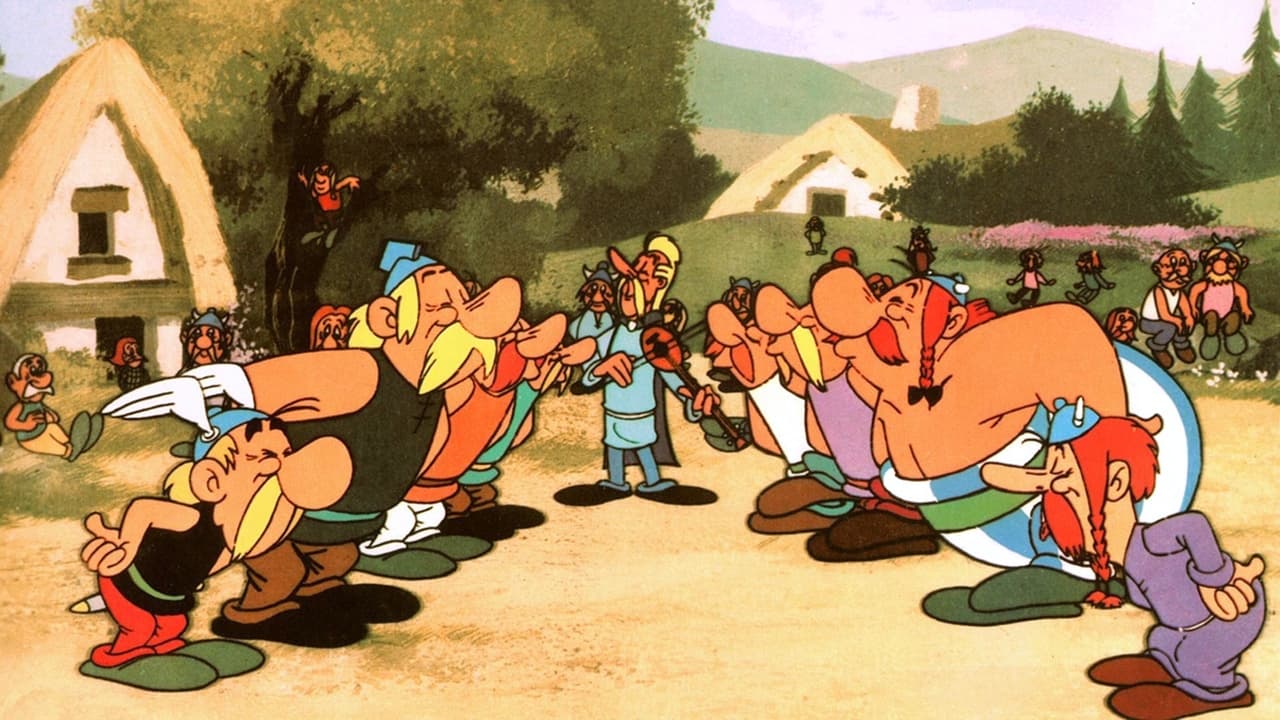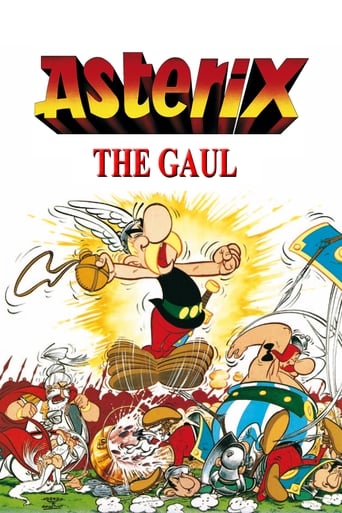

Asterix the Gaul is the film adaptation based on René Goscinny and Albert Uderzo's comic strip series. In said series Rome has invaded almost all of Gaul. All but for one tiny village on the northern shores of the land, where the villagers still keep the legions at bay with the help of their druid Getafix, who knows the recipe of a very special magic potion, which is capable of increasing its drinker's strength to inhuman levels. The comic strip is a beloved children's classic in Europe and widely read by adult population as well. So a film adaptation was inevitable.And in my opinion they succeeded pretty well. The film adapts the first album of the series, bearing the same name as the film, following its plot very closely. It's a simple story as far the adventures of Asterix and Obelix go, mainly meant to introduce the setting and the characters, but it's still filled with tons of humorous moments, outrageous characters and odd twists. It's nowhere near my favourite of these stories, but it's definitely head and shoulders above most of its peers.What really keeps this movie from achieving a greater ranking is the animation, and to a lesser degree the music, which both show the constraints of the budget. The character designs are identical to the comic books, so no complaints there, but the film reuses its animation sequences heavily, the movements are either too jerky or too linear, depending on the scene, and the backgrounds, while nice, are a bit simplistic. The music has a few good moments, and I especially like the main theme, but it's nothing overly special.Nevertheless, Asterix the Gaul is a good introduction into the world of Asterix and well worth a watch for all fans of humorous animation adventures.
... View MoreWatching "Asterix the Gaul" reinforced my conviction that its success in French theaters was mostly due to the popularity of the comic-book adventures, at its peak in 1967. At that time, the little Gaul was a national phenomenon whose iconic status expanded into the neighboring European countries. So, before reviewing the film, let's explore the secret of Asterix' appeal, the magic potion's recipe, to use a fitting metaphor.First, there's the tough little guy who personifies the French touch. The seminal setting is a small tribe resisting the Roman invasion, representative of France under De Gaulle's leadership, a small country defying the American imperialism in the name of cultural exception. Yet beyond the political undertones, there was a comical genius named Goscinny heavily influenced by Anglo-Saxon humor made of slapstick, parodies and adult innuendo. And because there's no content without a form, there's Uderzo's drawing style, one of the most admired in the French-Belgian school, along with other talents like Franquin and Gotlib, renowned for the extraordinary fluidity and dynamism when it came to draw movements. The shot of a roman soldier vertically ejected through one single uppercut is one of Asterix' defining trademarks, making the cover of the first adventure: "Asterix the Gaul".A punchy drawing for a punchy humor: nothing could have stopped the success story to reach the silver screen, only 8 years after the first publication in the magazine Pilote, a European combination of Mad and Marvel. The result is an objective disappointment and undermines any pretension to compete with American animation. Numbers never lie, in 1967, the film was viewed by 2,4 millions spectator against 14,7 for "The Jungle Book". Granted the film couldn't rival with Disney, but still, they could have made a better effort: the design of the Roman legionaries created an overabundance of gray and red, half the images were recycled, not to mention the horizontal movements worthy of the worst Hanna Barbera cartoons. To make it worse, the characters, who were all human, had four fingers, which is technical blasphemy, even by Disney standards.At the end, the most graphically interesting part was the opening with the five major Gauls' drawing (notice that the English names are different probably because the film was made before the comic-book adaptation, to tell you how old the film is). The rest is just pure cheap animation, typical of the worst TV programs, colors are bland, Obelix is inexpressive, with two dots for eyes and a mouth mechanically moving when he speaks, Jules Caesar looks nothing like the imposing Emperor who already had his distinctive traits in the books. What saves the film is the quality of the dubbing and a catchy theme with a child-like quality that seems like imploring you not to be so harsh on the animation department. All right, I'll temper my criticism now that I have the music in mind. Besides, to say that the film's only weakness is the animation would make too much honor to the screenwriters.The biggest problem is with the story, the first animated opus of Asterix' adventure could have got away with the rudimentary animation, but, why; of all the adventures, they picked up the least interesting story? Obelix plays no part during the whole third act, the starring duo was Asterix and the druid, the Romans were constantly ridiculed and the antagonist, Caius Bonus is so naive it's sometimes disconcerting. The gags are there, but the format of the story, perfect for a comic book or a TV episode, was stretched for almost one hour. And for the first time, the chauvinism seemed almost unintentional, the repetitive 'Hails to the Chief' whenever he spoke, made me cringe, even as a kid, especially since the character is supposed to be comical. And that's what the film clearly betrays, it feels as if it was not written by the authors.And guess what? I found out that no René Goscinny or Albert Uderzo were ever consulted for the making of the film, and they learned about the project a few months later and didn't like it. I knew there had to be a reason for the script' laziness but at least, the authors' honor was left intact, and their disappointment urged to make another film, with better quality. "Asterix and Cleopatra" is everything "The Gaul" is not, it has terrific music, animation, escapism and at least, it respects the spirit of the album with some hilarious fourth-wall breaking gags that show that the author's ambitions were aimed toward the big screen. In "Cleopatra" they apologize in advance for the problems of dubbing, which is humor-wise light-years ahead of "The Gaul"'s inoffensive cuteness.In conclusion, "The Gaul" isn't certainly as bad as my review implies, but heavily suffers from the comparison with its glorious successors. Its merit is to have put Asterix on screen, to have provided its eternal voice, to have grabbed the viewer's interest, but the authors knew it could have been a disaster for Asterix' future in cinema not to come with a new film, with higher quality, the flaws made the following films' strength. But it was a close one.Although it doesn't do justice to the comic-book, it's still an Asterix movie and worth viewing, but unlike the others, it won't give you the urge to watch it again. Even Asterix' reactions after drinking the magic potion didn't have that electrifying pep we used to enjoy, the potion indeed lacked some spicy flavor.
... View MoreI read the album then one day later I saw the film.Now in comparison to the other albums Asterix the Gaul is no where near the best. But its still good. And with this film it is the same Asterix the Gaul is no where near as good as the other films but it is still good.Maybe its the dubbing in the English language version but it just doesn't feel like it all came together. At times it was also confusing. They didn't explain or really animate the rapid hair growth of the Romans very well.The animation is not great but Asterix fans and young children should like it...
... View MoreThis is the first of the Asterix films and, I would say, the weakest. It is a very faithful translation of the first Asterix book. What this means is that many of the hallmarks of later Asterix books- the satire, the anachronisms, the well-developed cast of regular characters- are not present. Such humour as survives is rather weak. Excruciating pun names, such as Romans Phonus Balonus, Marcus Sourpuss and Petroleum Pumpus, are much in evidence, and attention is drawn to them wherever possible. There is a lot of cartoonish violence, but this becomes repetitive. There seems to have been a problem in translating this into English, as much of the dialogue seems to have been simply chopped up and fitted in wherever there is lip movement in the original. The result is that sentences are often rushed or split awkwardly, so one is presented with odd lines like, "He wanted to... become emperor!" and "What a brilliant... idea that is!" To add more translation confusion, there is an opening segment with pictures of the characters and their names. Unfortunately, this has been left in French. So the bard Stopthemusix (remember those awful puns?) is introduced as Assurancetourix at the beginning, and so on.While it's faithful to the book, it's not a film that you should watch unless you really, really like Asterix. And then only for curiosity value.
... View More